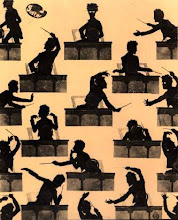I once read about the Vienna Symphony Orchestra that, though inferior to the Vienna Philharmonic,
on a good night, you'd be hard pressed to tell the two apart.
And it does seem part of the live orchestral concert experience, the thrill of the unexpected: the good night and the bad night; the promise of that magical improvised éncore...
It was with some trepidation that I went to an all-Ravel concert in the Odeon of Herodes Atticus (Athens, Greece), as part of the yearly Athens Festival, precisely for that reason.
The last concert I had attended in that (otherwise incredible) open-air venue was of Olivier Messiaen's Des Canyons aux Étoiles, a superb Ensemble InterContemporain playing literally against the wind. Would the weather be a problem? Would the orchestra, the Orchestre de Paris under Christoph Eschenbach's baton, be in good form?
As it turned out, the weather was not a problem: a fine day, not too warm, as is often the case for Greece, and just enough wind to make the evening pleasant. And the first piece on the programme, the fairy-tale suite Ma Mère l'Oie went off without a hitch; beautifully.
Indeed, there was quite unusually beautiful orchestral playing in evidence, fully in line with my expectations of a French orchestra playing Ravel: Eschenbach in full rapport with his orchestra, including an enchanting first violin, the piece was almost made inspiring.
All in all a very good (or even great) warm-up, followed by warm applause, then time for a break to cool off.
Back from the break, the orchestra took their seats, Eschenbach returned (more applause), and the real concert, one could say, began. La Valse was first, and what a valse!
What was previously the rapport of conductor and orchestra seemed to become an organic link between them. The orchestral sound, delivered impeccably through the "Herodion's" acoustics became as refined as the colours of a Renoir, or a Matisse. And the piece itself, the rhythm, the flow and the ebb, intensifying, dazzling, spellbinding.
Had the concert ended there, it would have still been an example of what an orchestra sounds like at the peak of their form on a truly "good night", that astonishing valse.
Still, there was more ahead: Daphnis et Chloé, the second suite, musical impressionism almost at its most lauded. And finally Bolero.
But here was the point where circumstances conspired to create something truly extraordinary: mid-way into Daphnis et Chloé, the mounting percussive climaxes awakened something more than the usual excitement of the audience.
It was a cicada, sitting on the ancient edifice above the orchestra. And an opinionated insect, to boot.
Cicadas, you see, produce a trademark buzzing sound to attract a mate. That sound is rhythmic, repetitive, and loud.
So this particular cicada saw it fit to initiate its mating ritual, given all the ruckus, yet never opting to consult Maestro Eschenbach about the tempo. In fact, it chose a tempo that was quite contrary to that of the orchestra at that moment - albeit very steady.
Enter a highly amused audience, and even more amused orchestra - smiles all around, grins, chuckles - yet not for a moment a note missed, a cue botched, a rhythm faltering...
If not for the rapidly-mounting mirth of the musicians and the fact that the music was getting louder and louder, even beyond the score's requirement, one might not have noticed a difference (assuming they could somehow erase the cicada's buzzing from the sound-picture).
This was an impressive feat of orchestral discipline and gusto. And Daphnis et Chloé was a particularly passionate affair to begin with, well-suited to the rising excitement all around, be it in the audience or the orchestra. But what of Bolero?
Bolero: grinding repetition, weaving of texture seemingly ad infinitum, then collapse.
In the hands of conductors like Herbert von Karajan, Bolero is hypnotic - a meditative trance gone awry. Maybe in the hands of Eschenbach it would have been that too.
He conducted it without hand-movements, cueing the orchestra purely with his eyes, leaving it in their hands.
(And here is where I wondered if "antics" like this are what has driven him out of Philadelphia, but that is an altogether different subject.)
So the orchestra were free to conjure up the sound, the rhythm, the repetition, the build-up. And all amidst the cicada accompaniment, which even stopped and changed tempo intermittently. Such a difficult situation for any orchestra, I was thinking.
But they took that excitement, that unexpected surprise, the mirth it generated, and they put it into the music.
I am still amazed by the results.
What is ordinarily (to me) a meditation became the musical equivalent of a caged animal struggling against its bonds.
More and more the sheer tension accumulated like static electricity, Eschenbach using his hands again, raising the tension ever higher, until at the end the music exploded; burst into pieces, shattered rather than collapsed. Even that cicada finally gave up.
The ovation(s) that followed almost shook the ancient auditorium. Eschenbach gave the flowers he was presented with to the drummer who held the rhythm for Bolero, an especially difficult task that night, and I left the Herodion grinning and breathless, smiles all around.
Thus was brought to a close a concert that begun as a "good night" for the Orchestre de Paris, and ended a musical revelation for yours truly. Never had I seen in Ravel's music the potential for such an elemental outburst. I still wonder if it was the music, or the moment.
Regardless, I will be back in Athens next summer - if only to remember that one night with the cicada, and Ravel unleashed.
